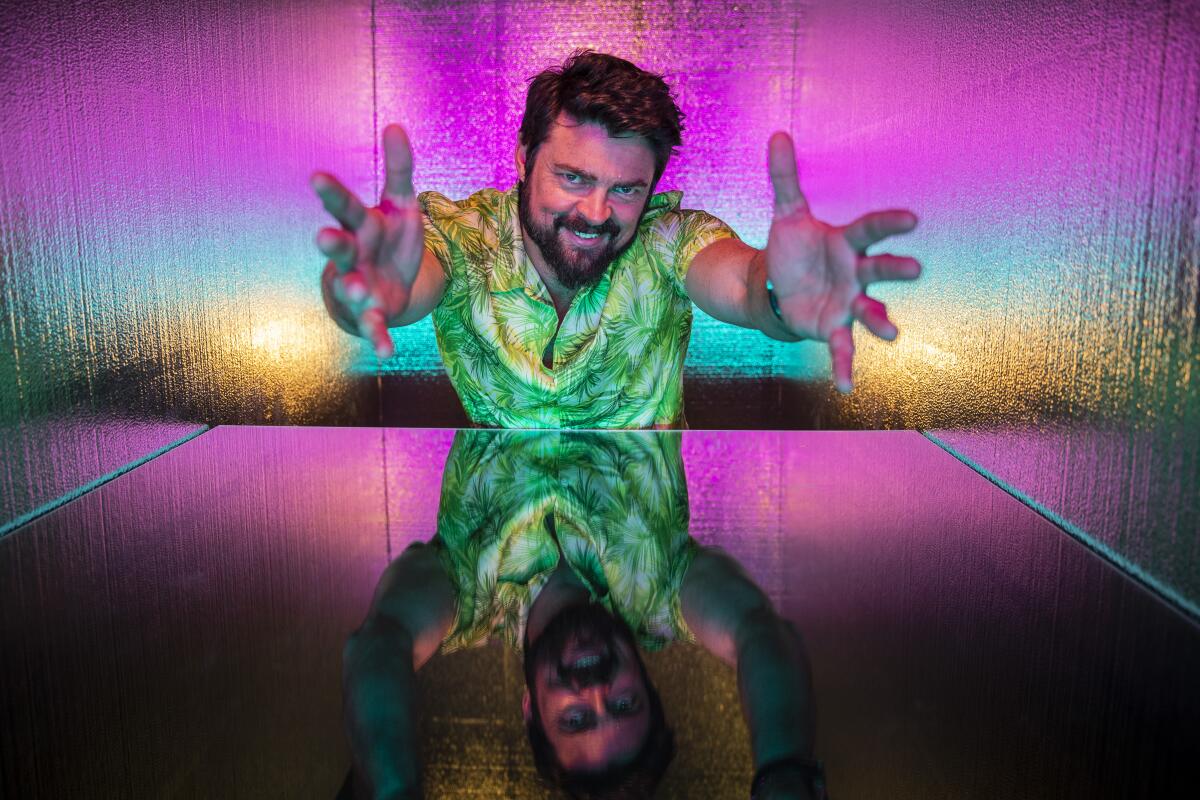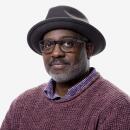Karl Urban has a Comic-Con legend’s career. It says more about Hollywood than him

There could probably be a Karl Urban convention.
From his current show, Amazon’s “The Boys” to playing Skurge in “Thor: Ragnarok” and Dr. “Bones” McCoy in “Star Trek” to roles in comic book movie titles “Dredd” and “Red” to Eomer in “The Lord of the Rings,” Urban has a sci-fi/fantasy/comic book movie résumé that could keep him in convention rotation for quite a while.
Alas, in-person gatherings have mostly been sidelined because of COVID-19, but the second season of “The Boys,” which launches Friday, will fill quarantine hours with the type of action and corporate subversion that the show has become known for. The superhero-hunting team at its center, led by Urban‘s Billy Butcher and rounded out by Hughie Campbell (Jack Quaid), Mother’s Milk (Laz Alonso), Frenchie (Tomer Capon) and Kimiko Miyashiro (Karen Fukuhara) is a dysfunctional group, to say the least. But a warped sense of honor makes them something of a family.
Family is also what Urban has been concentrating on during the COVID-19 crisis, using his at-home time in New Zealand to get closer to real loved ones.
“To me, this was a gift in the regard that it brought me closer to my family and we all got to spend a lot of time together and bond in a way that perhaps we wouldn’t have been able to or wouldn’t have had the opportunity to had there not been this pandemic.”
Urban’s family man persona is a far cry from the bloody character he plays on “The Boys.” We caught up with him to ask about Season 2, Butcher’s return and the glorious stunts the show is now known for.
“The Boys” is back for Season 2 on Amazon Prime Video. And whether you’re a super-skeptic or a Marvel fanatic, its blistering cultural satire is for you.
How are you during this pandemic?
I’m doing pretty well, thank you. Obviously I’ve had to deal with the same fear and anxiety as everybody surrounding the unknowing aspects of the virus. Here in New Zealand where I live, we went through a six-week lockdown and managed to [temporarily] eradicate it from our community, which is easier to do when you’re a small island country on the other side of the world. I’m just sort of praying that the smart people can find a vaccine so that we can all get back to some semblance of normality.
Normality in the industry — what will that mean for you in terms of getting on sets and precautions being put in place?
My response to that is probably the same as many professionals in the industry. I’m eagerly looking forward to getting back to work and interested to see what the protocols will be with regard to keeping a crew safe. I’m certainly not sure how that is all going to work, specifically from an insurance perspective. How do you insure a crew of up to 100, 150 people from a virus that currently has no cure? There’s a lot of unknown, but I’m confident that the solution will present itself.Speaking of unknowns, your version of Dr. McCoy on “Star Trek” was a hit with fans. Another film is rumored.
There seems to interest from a lot of different sectors to make that happen, so we’ll see. If it happens, it’ll be fantastic. If it doesn’t, well, we will move on.
“The Boys.” “Star Trek.” “Thor.” “Dredd.” “Lord of the Rings.” You’ve enjoyed the career of a Comic-Con legend. How purposeful is that pursuit of fanciful, sometimes comic book-related material?
The fact that I have been involved with so many properties that have their origins in graphic novels and comic books I guess speaks volumes about where Hollywood is deriving their source material. Back in the day it was books and other literary sources. Now the graphic novel has 50-plus great years of material for writers and showrunners to mine. To me, my interest is always first and foremost the character and the story. Particularly when it came to “The Boys,” it was clear to me that it was a well-written piece of material. I really responded to the character of Billy Butcher and his ability to just make others around him do what he wanted them to do.
Amazon’s subversive superhero series ‘The Boys,’ based on the famed creator’s own comic, deconstructs the genre Ennis calls “completely moronic.”
Butcher is one of the more interesting antiheroes onscreen. He was at first driven by revenge, now it’s something else. Describe him in Season 2 of “The Boys.”
For Butcher, this was an intense season. His desire to reunite with his wife is his main drive. Pretty much everything else is secondary to that. But along the way he’s forced to confront some hard truths about the reality of who he is. We get to come to a deeper understanding about the monster that’s living within Billy Butcher. And we come to understand that monster was there long before his wife went missing. I kind of like to think of Butcher like a Jekyll and Hyde character or an Incredible Hulk where there’s this transformation that occurs when he’s pushed over the edge. He turns into this monster — the kind of monster that bashes Mesmer’s [Haley Joel Osment] head into a bathroom sink. It’s just an ugly, ugly person. This season we sort of explore the nature of that, and in doing so, it humanizes Butcher in a kind of ironic way.
What would you consider the overall theme of the second season to be?
One of the central themes in Season 2 is loss and how to deal with it. Every character has something that is most precious ripped away from them, and the challenge is to see how they cope or fail to cope with that loss. For Starlight it’s her religion; for Hughie, it’s Starlight. Homelander has to deal with a constant challenge to his authority.
The bigger, bloodier stunts and scenes in the first season were renowned. Was there anything you had to do or witnessed in the second season that rivaled those?
Oh, my God, you have no idea! Season 1 was pretty shocking and explosive. Season 2 is just epic. I remember at the beginning of shooting Season 2, Eric Kripke, our showrunner, said, “Listen, we’re not gonna try to go bigger and bolder and be effects-driven. We’re gonna dive deeper and peel back the layers of our characters.”
[But] Season 2 was way bigger in the stunt/action department. One of my favorite sequences is in Episode 3. We spent a week on the water driving a speed boat. Eric Kripke saw Instagram posts of me on my boat during the off-season and thought that was a skill set he could utilize for the show. The fun aspect was that we did it all very old school. All of the actors were in the boat, no doubles, and we were really flying along, jumping waves while a helicopter with a long lens did multiple passes.
It takes old-school film technique to do it, and that means doing it for real. So Season 2 really meant raising the bar on a multitude of levels for us, not only our characters and the type of emotions that we get to explore, but also the physicality of it. It was a much more grueling season.
What else is occupying your time these days? Hobbies? Books?
I’m working on a few animated projects, one for Netflix; I’m excited about that. Beyond that, I’m just enjoying living in New Zealand at the moment because it’s one of the only countries in the world that [was] COVID-free, or at least has a handle on the situation. As to what I’m reading, well, recently, there’s this great biography by Lee Server called “Baby, I Don’t Care,” and it’s the story of Robert Mitchum. That’s a pretty interesting read. I’m just trying to get out and make the most of what this country has to offer. I think that a lot of people in a lot of different countries around the world are actually exploring. Now that they’re prohibited to travel to other countries, they get to explore their own.
More to Read
The complete guide to home viewing
Get Screen Gab for everything about the TV shows and streaming movies everyone’s talking about.
You may occasionally receive promotional content from the Los Angeles Times.







